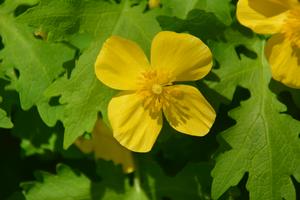Printed at http://www.newmoonnursery.com/index.cfm/
Stylophorum diphyllum
Celandine poppy (No Advance Orders)
Native to North America
NO ADVANCE ORDERS (NAO) - A selection of plants are NAO-No Advanced Orders. They have proved to be tricky; acquiring propagules, producing them, or getting them through the winter. We only put them on our availability lists when they are ready to ship. No hopes dashed. Plants must ship within 2 weeks or their availability date.
FIRST IMPRESSIONS: Stylophorum diphyllum is a low mounding wildflower with bold lobed leaves. In spring, stems are terminated by clusters of bright yellow poppy-like blooms. This unique perennial thrives in rich open woods or shade gardens with moist to average soil.
HABITAT & HARDINESS: Stylophorum diphyllum is indigenous to Eastern North America in Ontario and from Pennsylvania, Virginia, Tennessee, northern Georgia and northern Alabama west to Illinois, Missouri and Arkansas.
Plants occur in moist deciduous woods, rich ravines, calcareous bluffs and rocky stream banks and are hardy from USDA Zones 4-9.
PLANT DESCRIPTION: Stylophorum diphyllum is a low mounding perennial with lobed and deeply toothed foliage. Leaves occur in opposite pairs on the stem and in basal rosettes.
Blades are up to 6” long and 4” across with pubescent petioles. Leaves are blue-green and smooth on top and silvery green and pubescent beneath. Foliage contains a yellow-orange sap.
Stems terminate in solitary flowers or clusters of 2-4. Each flower is about 1-2” across with 4 bright yellow rounded petals on slender hairy stalks. Blooms have clusters of golden stamens and stout clubby chartreuse styles.
Blooming occurs in mid-spring for about 3 weeks. Flowers mature into nodding pubescent ovoid seed capsules. The capsules split into 4 segments releasing numerous seed.
Plants usually attain a height of 1-2’ and a spread of 1’.
CULTURAL & MAINTENANCE NEEDS: Stylophorum diphyllum grows best in dappled sun or partial shade in moist rich loamy soil. Plants tolerate full shade and acidic or alkaline pH.
This wildflower tolerates short periods of drought but leaves yellow or wither and plants may go dormant during extended drought.
This species can self-sow in garden situations. Deadhead before seed form if re-seeding is an issue. This species is relatively pest free and not palatable to deer and other herbivores.
LANDSCAPE USES: Stylophorum diphyllum is a useful Accent, Groundcover, Grouping or Mass Planting for the Shade Garden or Wildlife Garden. Plants provide Showy Blooms and are valuable components of Cottage Gardens, Deer Resistant Plantings, Rock Gardens, Low Maintenance Plantings and Perennial Borders.
COMPANION & UNDERSTUDY PLANTS: Try planting Stylophorum diphyllum with Aquilegia canadensis, Aruncus dioicus, Asarum canadense, Carex plantaginea, Phlox divaricata, Polystichum acrostichoides or Tiarella cordifolia.
If a substitute is needed, Aquilegia canadensis ‘Corbett’ is another yellow flowering wildflower with similar height and cultural needs.
TRIVIA: The flowers provide pollen to native bees, flies and beetles. Chipmunks and woodland mice eat the seed. The foliage is toxic and is usually avoided by deer and other mammalian herbivores.
Stylophorum diphyllum seed are distributed by ants through a process known as myrmecochory. The ants seek the seed for their elaiosomes which are white fleshy attachments filled with lipids and proteins. They transport the seed back to the nest, feed the elaiosomes to the larva and discard and distribute the remnant seed.
Stylophorum diphyllum is commonly called Wood Poppy. The generic name is from Greek words meaning “style bearing” referring to the pistil’s prominent club-shaped style. The specific epithet, is from Greek words for “two leaf” due to the pairs of opposite stem leaves.
This species has spotty distribution and isolated occurrences in high quality woodlands. It is being threatened in the wild by invasive garlic mustard (Alliaria petiolata) and Japanese stiltgrass (Microstegium vimineum).
Height:
1-2 ftSpread:
1 ftSpacing:
18-24 inUSDA Hardiness Zone:
4-9Bloom Color:
YellowStylophorum diphyllum Characteristics
Attracts Wildlife
- Pollinators
- Butterflies
Attributes
- Ground Cover
- East-Coast Native
- Drought Tolerant
- Rain Garden
- Bog
- Rock Garden
- Naturalizing
Exposure
- Partial Shade to Full Shade
Deer Resistant
- Deer Resistant
Flowering Months
- April
Foliage Color
- Green
Growth Rate
- Medium
Season of Interest (Foliage)
- Summer
- Spring
Soil Moisture Preference
- Moist

